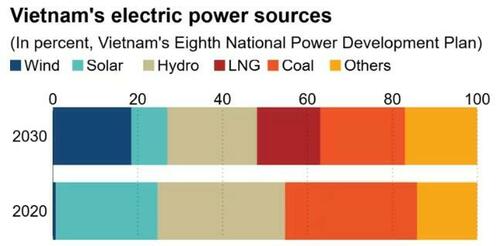Over 40 investors in Vietnam’s solar and wind energy sector are warning they may default unless the government honors its original pricing commitments, according to Nikkei Asia.
Vietnam had initially offered feed-in tariffs ranging from 7.09 to 9.35 U.S. cents per kWh for solar energy, valid for 20 years, to attract investment and support the country's shift to renewable energy. However, the government now wants to pay in local currency at a rate equal to 4.7 U.S. cents per kWh—a cut of 34% to 50%, depending on the exchange rate.
Most affected projects are solar farms, and many investors have reported delayed or reduced payments from the state utility Electricity Vietnam (EVN). These delays stem from a government review claiming that key documentation—the construction completion acceptance (CCA)—was missing, despite not being required at the time.
Investors argue that most projects have since secured the document and paid related penalties.
In a letter sent on May 16 to top leaders including Communist Party chief To Lam and Prime Minister Pham Minh Chinh, the investors urged the government to protect what they described as Vietnam’s “contractual integrity, regulatory consistency, and the credibility” of its investment environment. They also warned that the dispute “poses serious and immediate risks to investor confidence, financial stability, and Vietnam’s long-term energy and climate objectives.”
Concerns have grown over EVN’s proposal to retroactively change terms, which could require investors to return past payments. One Vietnamese investor noted that while the rules have shifted, most developers are now in compliance.
The Nikkei report says that the letter—signed by more than 40 foreign and local investors representing a combined 6.38 gigawatts of capacity—also noted that over $13 billion in equity is at risk, including about $4 billion from foreign-led projects.
Signatories include Japan’s Fujiwara Energy and Toho Gas, Thailand’s B.Grimm Renewable and Super Energy, the Philippines’ ACEN, Portugal’s Sunseap, and the Netherlands’ SEP. The group warned that they are breaching loan agreements and face growing risks of default. According to the letter, the situation has led to cash flow problems affecting “plant maintenance, repairs, and operations,” threatening project sustainability and business operations overall.
Vietnam’s export-driven economy relies heavily on foreign capital and competitive energy prices. With growth expected to hit 8% this year and even higher in the coming years, the country is facing rising energy demand. Power outages in 2023 already rattled manufacturers and residents in the north.
EVN posted nearly $1 billion in losses last year, following an $800 million shortfall in 2022. Although it was still in deficit in the first half of 2024, price hikes eventually helped the utility return to profit by year’s end.
Authorities have so far maintained that only projects meeting all formal requirements are eligible for the favorable pricing.
Dominic Scriven, chairman of Dragon Capital, whose firm has 123 megawatts of solar affected by the changes, said the lack of clarity is already hurting both investor confidence and the stability of ongoing projects. He added that he hopes the government will act constructively to resolve the dispute.
Even companies without current feed-in-tariff projects are watching closely. Kengo Nagaki, deputy chief representative of Tokyo Gas in Vietnam, said that while his firm’s projects are not affected, “if this were to happen, it would be a concern for foreign investors.”
He emphasized that the government cannot meet its renewable energy targets without international investment.
